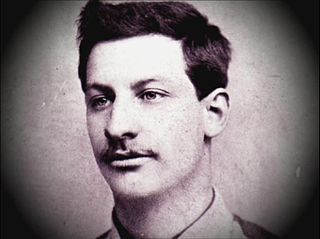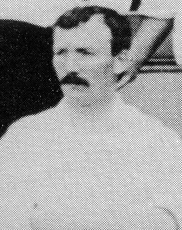
William Isiah Bassett was an English association footballer, director, and club chairman who served West Bromwich Albion for over half a century.
Anthony William Currie is an English former footballer who had significant spells for Sheffield United, Leeds United and Queens Park Rangers as well as representing England.

Ernest Needham was an English footballer and cricketer. He played in sixteen international football matches for England and captained the side in 1901.
Alan Woodward was a professional footballer who played in the position of outside right for Sheffield United over a 16-year period between 1962 and 1978.
Walter Henry Hammond was an English footballer who played as an outside left. Born in Chorlton-cum-Hardy, Manchester he played for Everton, Sheffield United, New Brighton Tower and Leicester Fosse in The Football League between 1889 and 1901.
John Pickering was an English footballer who played for Sheffield United between 1925 and 1948. He played in the position of inside left.
Ellis Hall was an English footballer who played for Hull City, Stoke, Huddersfield Town, Hamilton Academical and Halifax Town.
Charles Perry was an English football centre-half who played for West Bromwich Albion and England.
George Timmins was an English footballer who played at left-half. George Timmins signed for West Bromwich Albion in 1880, turning professional in August 1885. From August 1885 through to April 1888, the last three seasons before the Football League commenced George Timmins was part of three FA Cup Final teams 1885 – 1888. He obtained a Winner's medal in 1888 when the Albion defeated Preston North End 2–1 in the Final.
Harold Green was an English footballer who played at both right and left full-back.

The 1914–15 season was the 26th season in existence for Sheffield United, during which they played in Division One. At this time the club did not employ a manager, with the team being selected by the Football Committee although the club secretary, John Nicholson, undertook many of the duties now associated with a team manager. The club continued to establish itself as one of the top sides in the country, finishing sixth in the First Division and beating Chelsea 3–0 in the final to become winners of the FA Cup.
John Drummond was a Scottish footballer who played as a midfielder. Born in Edinburgh, Scotland he had spells with Partick Thistle, Preston North End, Sheffield United, Liverpool and Barnsley St. Peter's before retiring.
The 1889–90 season was the first in existence for Sheffield United. Having not been elected to any organised league at that point they predominantly played friendly fixtures but did enter the FA Cup for the first time as well as locally arranged cup competitions The Sheffield Challenge Cup and the Wharncliffe Charity Cup. The club did not employ a manager in this period; tactics and team selection were decided by The Football Committee and the players were coached by a trainer. J.B. Wostinholm held the position of club secretary, dealing with player transfers and contracts, arranging matches and dealing with the FA. The first season was deemed a reasonable success with steady attendances to home games and progress in the FA Cup although the fluctuating nature of the team meant that consistency was never really achieved.
The 1890–91 season was Sheffield United's second, and their first and only season playing in the newly formed Midland Counties League, as the club sought to establish itself as a major footballing force. The team was selected by the club's football committee and coached by a trainer, but day-to-day affairs were overseen by club secretary Joseph Wostinholm. The club saw a large influx of players during the season as it continued to bolster its numbers with amateurs loaned or signed from other teams in the local area, a policy that resulted in an unsettled side, indifferent league results, and a mid-table finish.

The Sheffield United F.C. Player of the Year is an annual award presented to players of Sheffield United on behalf of the club's fans to recognise an outstanding contribution to the previous season. First presented in 1967 the award was organised by the Official Supporters Club and voted for by its members. The award was officially recognised and commemorated by the club and since the late 1990s has been presented at a gala dinner. From around 2000 the award was widened to include voting from the general fanbase and various other awards have also been presented including Young Player of the Year and Goal of the Season.
The 1891–92 season was the third in existence for Sheffield United. This was their first season playing in the recently formed Northern League as the club sought to establish itself as a major footballing force. The Blades had a reasonably successful season, finishing third in the league, and registering some comprehensive victories along the way. They improved on the previous season by reaching the second round proper of the FA Cup and were victorious in the local cup competitions, winning both the Sheffield Challenge Cup and the Wharncliffe Charity Cup for the first time.
W. H. Patterson was a Scottish footballer who played in The Football League for Sheffield United between 1891 and 1892. Primarily a defender he also filled in on various positions during his time at Bramall Lane.
Joseph Davies was a Welsh international footballer who played as an inside right.
The 1892–93 season was the fourth in existence for Sheffield United. This was their first season playing in the recently formed Football League Second Division as the club sought to establish itself as a major footballing force. With some members of the football committee unconvinced of the long-term future of the Football League, the club also retained its membership of the Northern League.




